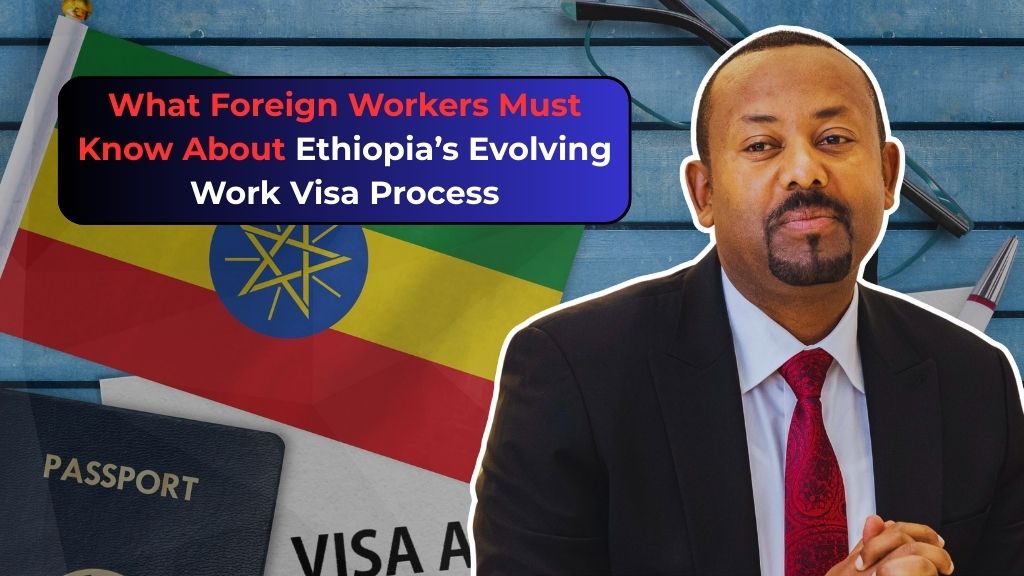Ethiopia’s growing economy and rising connections with global businesses are pulling in more foreign pros who want to live and work in this lively East African country. If you’re one of them and you’re eyeing a job in Ethiopia, getting a grip on the 2025 work visa process is key. A clear understanding now saves you time later and helps you play by the immigration rules of the land.

The Work Visa 101 you Need to Know
The country rolls out work visas for non-Ethiopian citizens who already have a job lined up or want to carry out approved business in the country. This visa is the green light that lets you fly in, stay, and work legally for a set time period. Even in 2025, the government is still fine-tuning the rules to make the trip less bumpy, but security and the economy are always top of the agenda.
Paperwork is the name of the game, and the checklist is serious: a passport that’s still got life in it, a signed job offer with an Ethiopian employer, and proof that you’re good at what you do. Authorities want to see that your skills are in line with local needs and that you’ll add value to the economy.
Step-by-Step Guide to Applying for a Work Visa
You’ll want a job offer in Ethiopia before starting a work visa. So let’s say you have a letter saying you’ve been hired. Either you or the company will take the visa case to the Ethiopian Embassy or consulate in your home country.
Here’s what you’ll need to do in order:
- Fill out the visa application form and add a passport-style photo.
- Hand in a passport that’s good for at least six months.
- Show the official work contract or a letter from your new employer.
- Provide copies of your academic and professional certificates that support the position.
- Obtain a police clearance certificate that says you have no criminal record.
- Pay the visa processing fee the consulate lists.
Next, the Ethiopian Ministry of Labor and Social Affairs may double-check that your job is necessary for the economy and that you have the right qualifications. Only then will your visa be sent for approval.
Be Sure to Notice 2025 Changes and Handy Info
This year, visa officers are checking that certificates, diplomas, and contracts are real and that job titles match the skills, to stop misuse. Make sure your paperwork looks official. Rejections or delays will happen if your documents are messy, outdated, or different from one another.
Filling out an Ethiopian visa application is now more convenient than ever. Most forms can be sent in online, which saves time and makes it easier for people from far away. Still, some tasks—like meeting an official in person to take fingerprints or attend an interview—may happen at a consulate, so plan ahead.
Keep track of how long your visa will last. If it looks like you’ll need to stay longer, you can ask for an extension. Submit that request from within Ethiopia before your current visa runs out to stay within the country the right way.
How Employers Help in the Work Visa Process
In Ethiopia, it’s the hiring company that kicks off the application for a foreign employee’s work visa. They need to provide a job contract, a sponsorship letter, and other documents that prove they are following the country’s hiring rules for foreign talent.
To avoid delays, many foreign firms—especially the large multinationals and NGOs—hire lawyers or immigration firms. These specialists know the ins and outs of the visa system, so forms are completed correctly the first time.
Getting Ready for the Move to Ethiopia
Once the visa looks certain, the new employee should get ready to settle in. Ethiopia is an exciting country that mixes age-old traditions with a fast-growing job market. However, new arrivals need to be curious, flexible, and ready for some surprises.
Learn a few words of Amharic, understand how the work week might differ, and start looking at neighborhoods. Knowing these practical bits, in addition to the visa rules, will make the move smoother and the new job more satisfying.
